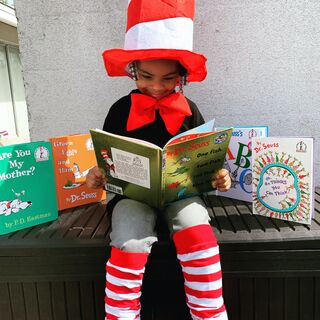Self-Control
Self-Control: Staying Calm, Focused, Present, and Productive
How to help your child with coping, resilience, achievement, health, and success
Posted November 1, 2020 Reviewed by Devon Frye

We all know what poor self-control looks like: a hot quick temper, low frustration tolerance, short attention span, restlessness, distractibility, and more. One of the biggest gifts you can give your child is self-control. If they know how to regulate their emotions and their behavior, they’ll do better in almost every area of life.
If you have more than one child, you probably know that self-control comes more easily to some kids than to others. One of my daughters was remarkably good at staying calm, processing her emotions constructively, and staying on task from a very early age. The other—also now in her forties—has a more impetuous temperament, and can still find it challenging to control her immediate reactions. Both of them are living happily productive lives, so don’t despair if you have a child who doesn’t take easily to learning to manage their responses. With love, time, and attention, even a wild child can learn self-control.
Research Findings: The Importance of Self-Control
Self-control is “the ability to manage or regulate impulses and desires in a socially appropriate way, rather than be managed or regulated by them,” according to Jay Belsky and colleagues in The Origins of You. They describe their findings from the Dunedin Study, which involved forty years of research with a thousand children as they grew into middle age. They found that self-control in childhood predicted many dimensions of life decades later. Good childhood self-control didn’t necessarily lead to better functioning later, but it was a good predictor of what came later.
Belsky and colleagues assessed self-control by looking for its absence, including low frustration tolerance, restlessness, impulsivity, impulsive aggression, distractibility, and lack of persistence. They used observational data on each child, generated by trained observers, parents, and teachers at the ages of three, five, seven, nine, and eleven. They also used self-evaluations at eleven, and a variety of measures at thirteen, fifteen, eighteen, and twenty-one, followed up by interviews, supplemented with real-world measures like health and police records, at twenty-six and thirty-two. They found that poor self-control in childhood predicted behavior problems in adolescence, as well as health concerns, poverty, and criminal activity in adulthood.
Belsky and colleagues concluded that childhood self-control is enormously important, affecting health, wealth, and happiness in adulthood. They also emphasized that development is an ongoing, dynamic process, open to environmental factors, including support from adults. Interventions teaching self-management can make a long-term difference to a child’s development, whether implemented in early childhood or later.
Stuart Shanker distinguishes between self-regulation and self-control, seeing self-control as the inhibition of strong impulses, and self-regulation as a reduction in the frequency and intensity of strong impulses by managing stress-load and recovery. This may be a valid distinction, and certainly, Shanker has a wide following of people who have benefited from this perspective. He reminds parents of the need to listen calmly when their child is in distress, rather than getting angry or irritable. Almost always, an out-of-control or misbehaving child responds better to patient soothing than to punishment. Mona Delahooke makes the same recommendations, based on a distinction between top-down (consciously regulated) and bottom-up (unconsciously driven) behavior.
Recommendations
Whether you think of it as self-control or self-regulation, managing reactions is important to every area of life. This is especially true now, at a time of heightened stress and anxiety in so many dimensions of life. Good self-regulators remain calm when challenged. They retain their capacity to respond intelligently, wisely, and well, to whatever situation presents itself.
Here are some ideas for supporting your child’s ability to regulate their reactions to the inevitable stressors of living in a time of uncertainty and fear:
- It starts with you. Take a deep breath. Take another. Get enough sleep and exercise. Eat nutritious meals. Do your best to regulate your own emotions and behavior.
- Be patient. When your child misbehaves or over-reacts, be calm, kind, and supportive. That both models what self-control looks like, and soothes the child’s turbulence, which precedes their ability to regulate their emotions and reactions.
- Give your child special chores. Look for ways your child can make a contribution to the household by helping you. Ask for help with laundry or cooking, or some other task your child might enjoy doing with you, and later (once they’ve mastered it) by themselves. By helping out in a real way, your child will feel less powerless, and more valued.
- Get physical. Physical activity can help with stress reduction and self-regulation. Make sure your child is getting enough outdoor time and exercise.
- Establish and maintain routines. Regular family routines—meals, chores, bedtime, other schedules—provide a sense of control and trust in a world that often feels chaotic and unpredictable.
- Cultivate a growth mindset. Support your child in learning how to respond productively to adversity, by welcoming obstacles as learning opportunities. Help them see that all learning happens one baby step at a time.
- Teach mindfulness. Help your child learn how to pay attention to their emotions, breathing deeply and slowing down their responses to difficult situations.
- Role-play challenging scenarios. Think about a situation that challenged your child’s coping skills. Take turns with your child, each of you playing each part as you navigate the situation unsuccessfully and successfully. Do it with kindness and good humor, laughing with your child if they find something funny, and never laughing at them.
Now more than ever, it’s time to strengthen your own self-control, and support your child in developing theirs.
This is part of my blog series based on The Origins of You: How Childhood Shapes Later Life, by Jay Belsky, Avshalom Caspi, Terrie Moffitt, and Richie Poulton. See also, in this series,


